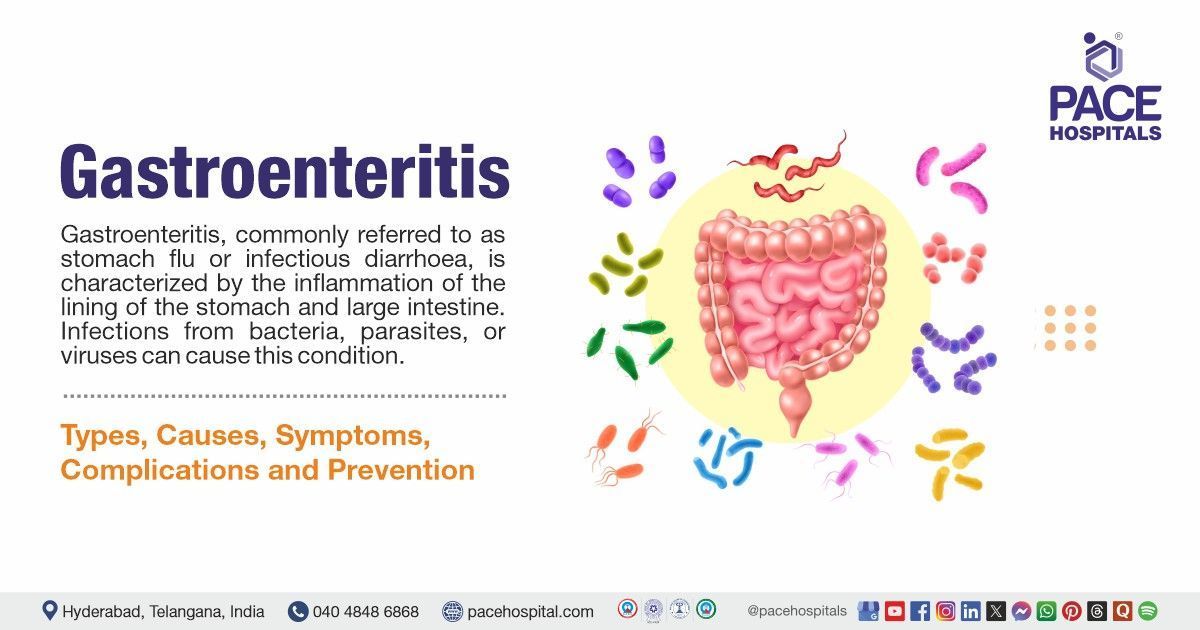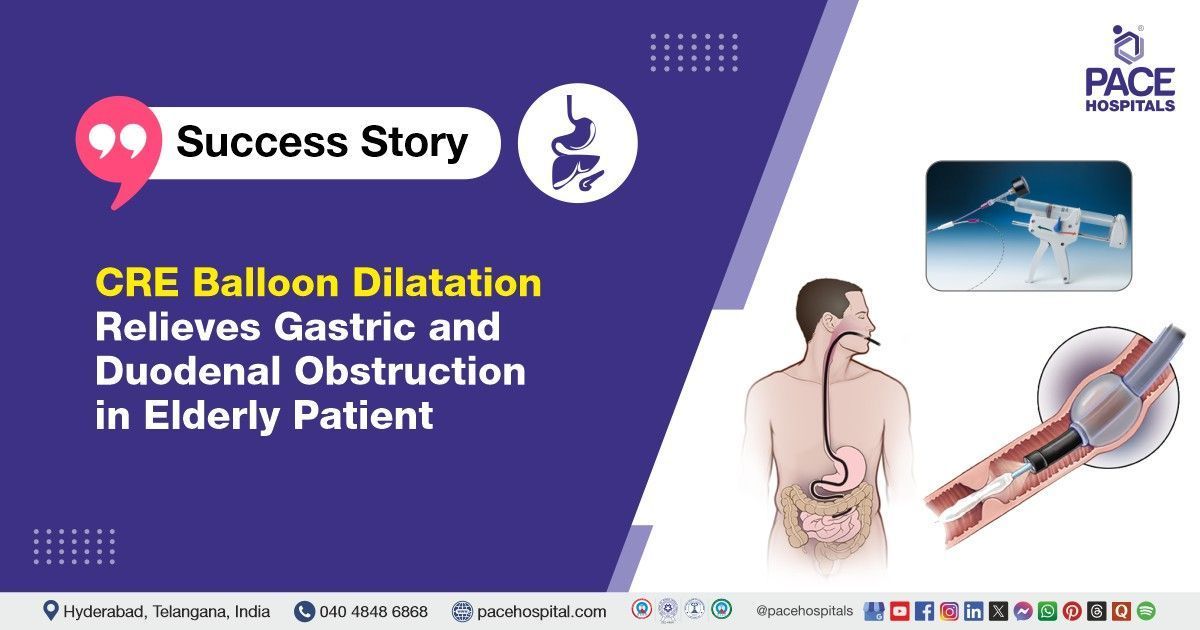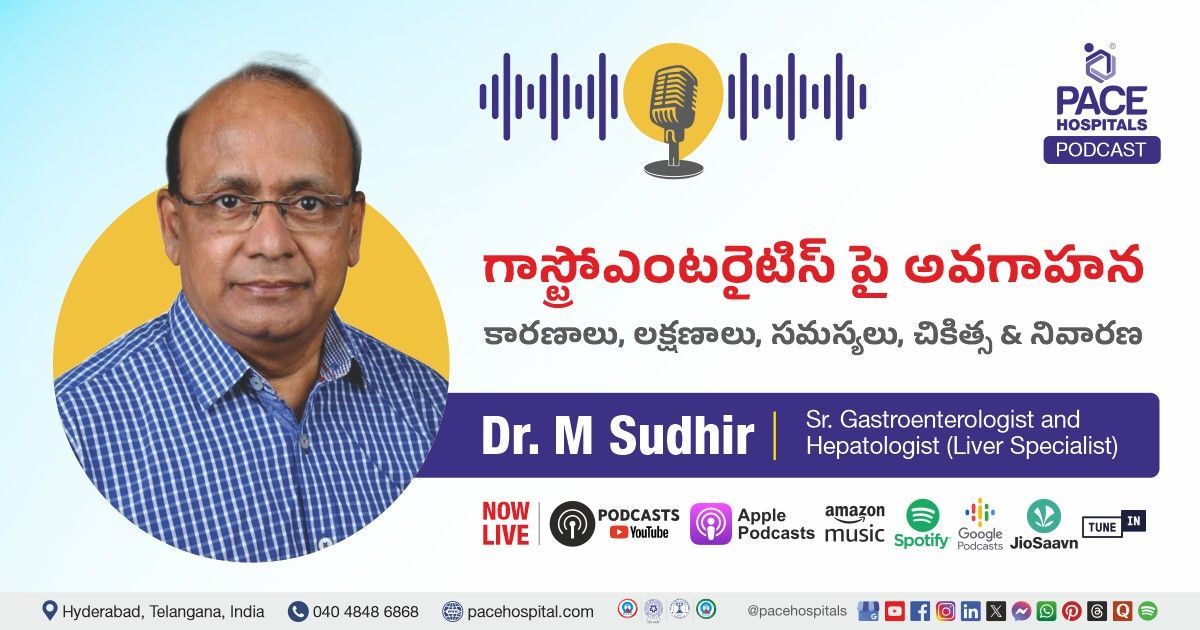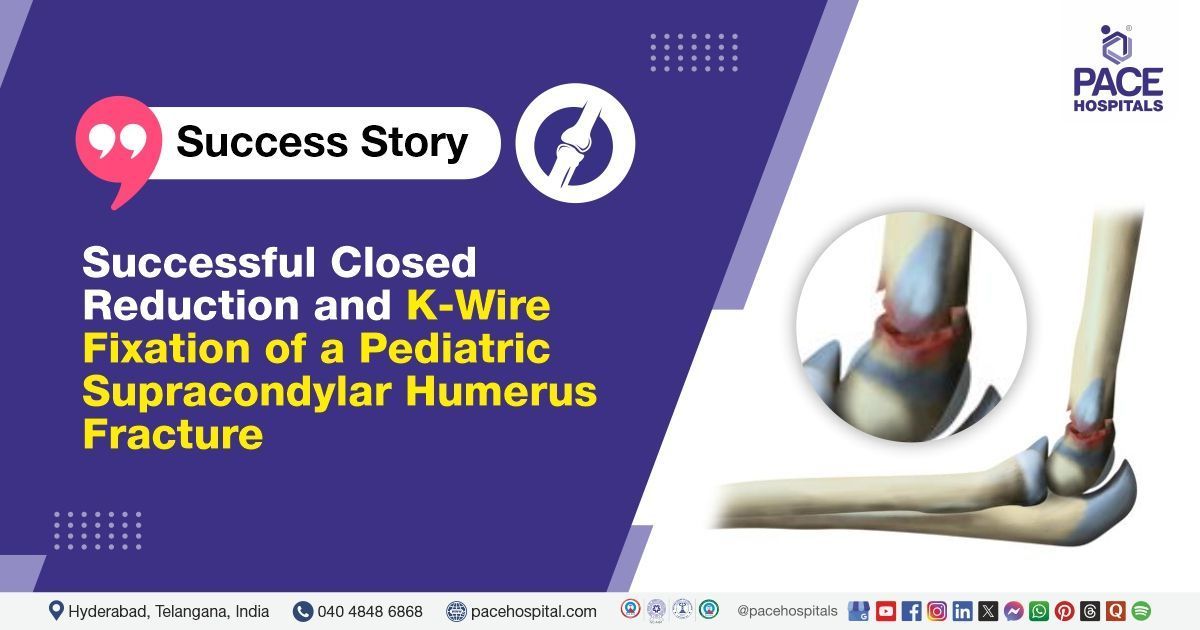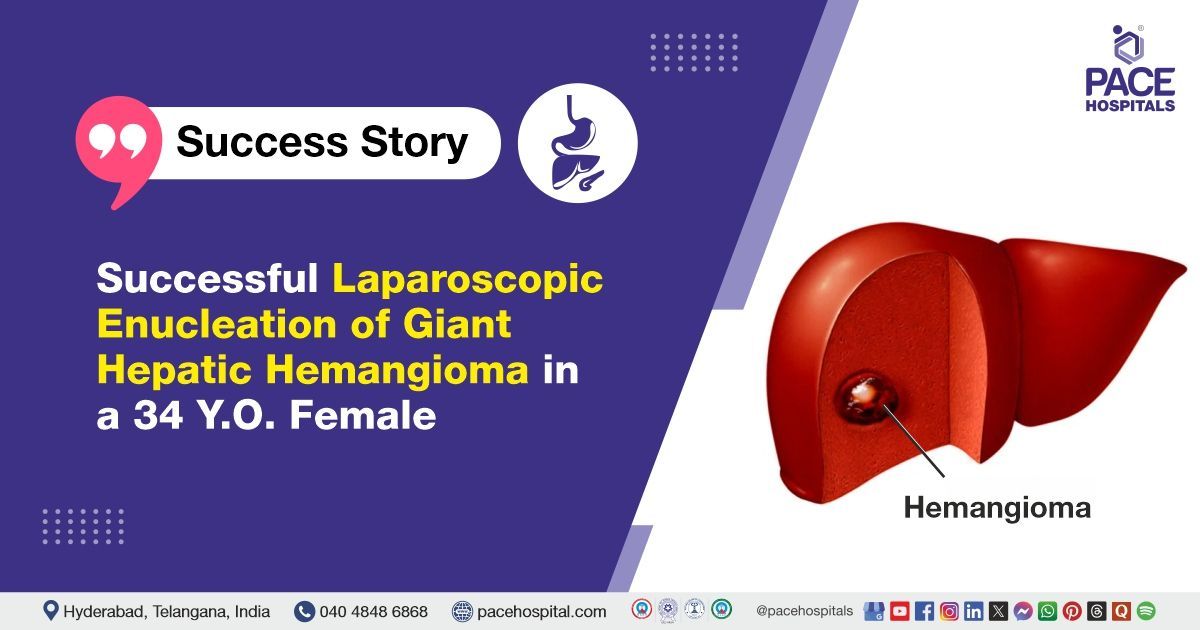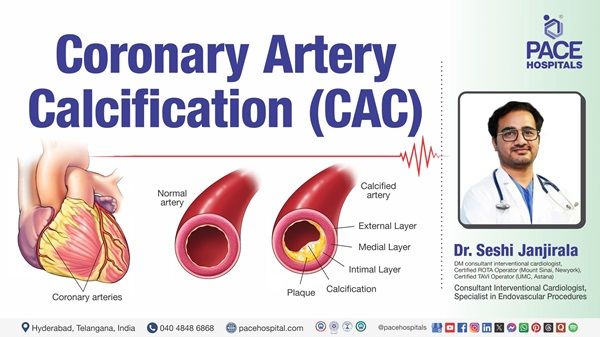Gastroenteritis: Types, Causes, Symptoms, Complications, Treatment & Prevention
Acute gastroenteritis definition
Gastroenteritis, commonly referred to as stomach flu or infectious diarrhoea, is characterized by the inflammation of the lining of the stomach and intestines. Infections from bacteria, parasites, or viruses can cause this condition. Additionally, gastroenteritis can result from food poisoning, allergic reactions, or certain medications and foods.
Gastroenteritis affects people of all ages, but is particularly common in young children. In children, most cases are caused by rotavirus, while in adults, it is typically triggered by norovirus (commonly known as the "winter vomiting bug") or bacterial food poisoning. A gastroenterologist can effectively diagnose, treat, and manage the condition, ensuring proper recovery and preventing complications.
Acute gastroenteritis meaning
The term "gastroenteritis" is derived from the Greek words "gastron", meaning "stomach," and enteron, meaning "small intestine." The word "gastro" itself comes from the Greek term "gaster" (genitive gastro), which refers to the "belly," "paunch," or "womb." Medically, “acute” means a short-term condition, whereas gastroenteritis refers to a diarrheal illness characterized by an increase in the frequency of bowel movements, along with symptoms such as fever, vomiting, and abdominal pain.
Gastroenteritis Prevalence
Prevalence of Gastroenteritis worldwide
According to the Centers for Disease Control, viral gastroenteritis infections account for over 20 lakh childhood deaths per year worldwide. Acute gastroenteritis (AGE), characterized by diarrhoea, vomiting, fever, and abdominal pain, causes 13 lakh deaths globally every year.
Traveler's diarrhoea affects more than half of the people traveling from developed countries to developing countries. Each year worldwide, about 16 lakh people die from infectious gastroenteritis.
Prevalence of Gastroenteritis in India
In India, an estimated 113.7 lakh cases of rotavirus gastroenteritis occur each year, leading to 32.7 lakh outpatient visits, 8.72 lakh hospital admissions, and 78,000 deaths annually.
Among these, approximately 59,000 deaths occur within the first two years of life. The introduction of a rotavirus vaccine with efficacy similar to ROTAVAC in the national immunization program could result in 6.86 lakhs fewer outpatient visits, 2.91 lakhs fewer hospitalizations, and 26,985 fewer deaths each year in India.

Types of Gastroenteritis
Gastroenteritis is classified into different types based on the factors that cause it. The three main types of gastroenteritis in adults are as follows:
- Acute Gastroenteritis
- Traveler's gastroenteritis
- Foodborne gastroenteritis
- Antibiotic-associated gastroenteritis
- Chronic Gastroenteritis
Acute Gastroenteritis
A sudden-onset intestinal infection causes diarrhoea, vomiting, abdominal cramps, and dehydration, usually lasting a few days to two weeks. It is commonly caused by viruses, bacteria, parasites, or food poisoning. The following are the different types of diarrhoea:
Traveler’s Diarrhea: Traveler's diarrhoea is typically transmitted through contaminated food or water and can be caused by bacteria, viruses, or parasites. Bacteria are responsible for most cases of traveler’s diarrhoea, with the most common culprits being enterotoxigenic E. coli (ETEC), followed by Salmonella, Campylobacter jejuni, and Shigella. Common symptoms include malaise, loss of appetite, abdominal pain and cramping, watery diarrhoea, nausea and vomiting, and low-grade fever. If the infection is caused by Campylobacter jejuni or Shigella, the symptoms may progress to colitis (inflammation of large intestine (colon)), bloody diarrhoea, and tenesmus (persistent and painful sensation of needing to have a bowel movement).
Foodborne gastroenteritis: Foodborne gastroenteritis can be broken down into 3 mechanisms:
- Pathogens that make a toxin in the food before it is consumed (preformed toxin)
- Pathogens that make a toxin in the gastrointestinal tract after the food is ingested
- Pathogens that invade the bowel wall and directly break down the epithelial lining, releasing factors that cause inflammatory diarrhoea.
Pathogens that make a toxin in the food before it is consumed (Preformed toxins):
Staphylococcus aureus tends to grow in dairy products, meat, eggs, and salads. On the other hand, Bacillus cereus grows in starchy foods like rice but can also be found in beef, pork, and vegetables. The symptoms of nausea and vomiting occur shortly after eating as a result of ingesting toxins that were already formed in the food. Before food is eaten, Staphylococcus aureus and Bacillus cereus produce heat-stable toxins that can cause food poisoning. These bacteria are commonly spread by food handlers and are often found in picnic foods.
Pathogens that transmit illness by making a toxin after consumption:
- Clostridium perfringens: This bacterium will spread through the consumption of spores that have germinated in foods like beef, pork, home-canned foods, and poultry. Symptoms typically include frequent watery stools, abdominal cramps, and rarely fever, nausea, or vomiting.
- Enterotoxigenic Escherichia coli (ETEC): This bacterium will spread through food or drinks contaminated with feces. When the bacteria attach to the small intestine, they produce enterotoxins that draw fluid and electrolytes from the intestinal lining into the gut. This leads to watery diarrhoea, which can range from mild to severe.
Pathogens that directly invade the bowel wall cause inflammatory diarrhoea
- Enterohemorrhagic E. coli (EHEC) (Shiga toxin-producing): This infection starts with watery diarrhoea that quickly turns bloody. Symptoms also include an elevated white blood cell count, abdominal pain, cramping, and vomiting. A low-grade fever (or no fever) helps distinguish EHEC from other bacterial causes of bloody gastroenteritis.
- Salmonella: This bacterium will spread by eating contaminated fruits, vegetables, ice cream, peanuts, raw or undercooked meats, or eggs. It can also transmit through contact with sick animals, like pet turtles and ducklings. Symptoms include gastroenteritis and fever.
- Campylobacter jejuni: This infection is often caused by eating or handling undercooked chicken, raw milk, or cheese, drinking contaminated water, or handling infected animals. Symptoms include abdominal pain, nausea, vomiting, and diarrhoea, followed by fever, chills, headache, and general fatigue. In severe cases, the diarrhoea may be bloody or black.
- Vibrio parahaemolyticus: This bacterium is the leading cause of bacterial gastroenteritis worldwide. It spreads through eating contaminated seafood like crabs, oysters, and clams, or from contact with tainted seawater, especially through open wounds. The infection typically causes nausea, vomiting, cramping, and sudden, severe watery diarrhoea. Fever is less common.
- Shigella: This infection mainly affects children under the age of 5. It spreads through contaminated food or water, or via person-to-person contact through the faecal-oral route. Symptoms include fever, abdominal cramps, and diarrhoea, which is often bloody. Infants may not have bloody diarrhoea.
Antibiotic-Associated Diarrhoea: Antibiotic-associated diarrhoea is often caused by Clostridium difficile (C. Difficile) colitis. Hospitalized patients are at a higher risk of getting infected with this bacterium, and the longer a patient stays in the hospital, the greater the risk. The likelihood of contracting C. difficile is also higher with the use of certain drugs and longer courses of antibiotic treatment.
The antibiotics most commonly linked to C. difficile infections include cephalosporins, penicillin, clindamycin, and fluoroquinolones. On the other hand, antibiotics including vancomycin, metronidazole, aminoglycosides, and doxycycline are less likely to cause C. difficile infections. Additionally, the use of proton pump inhibitors (medications that reduce stomach acid) also increases the risk of C. difficile infection.
Chronic gastroenteritis
Chronic gastroenteritis refers to the long-term inflammation of the stomach and intestines, resulting in symptoms such as persistent diarrhoea, abdominal pain, nausea, and bloating. While acute gastroenteritis typically lasts less than 14 days, persistent gastroenteritis lasts between 14 and 30 days. In contrast, chronic gastroenteritis endures for more than 30 days.
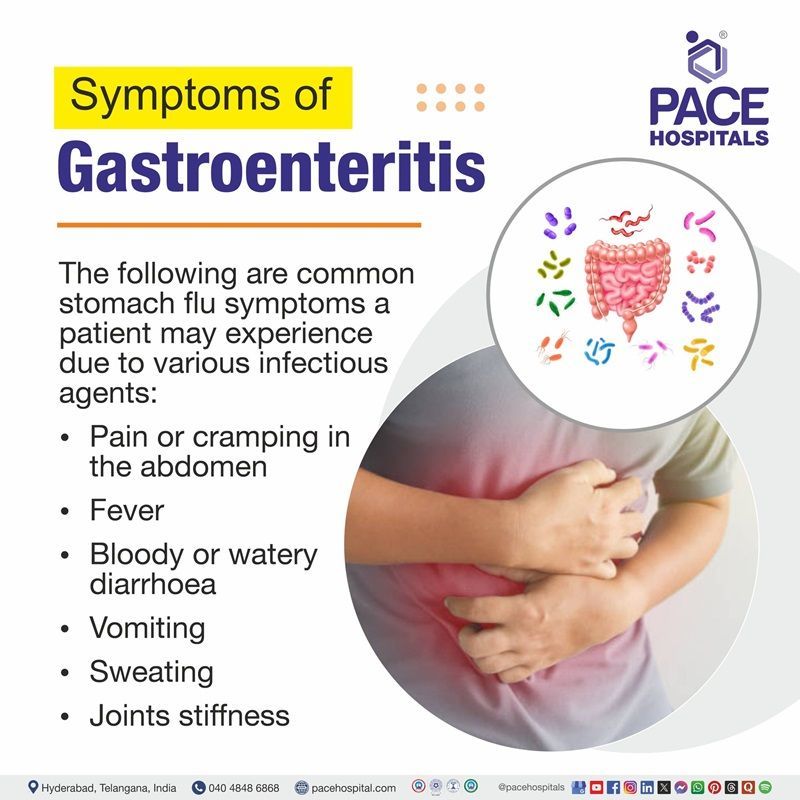
Gastroenteritis Symptoms
Gastroenteritis symptoms in adults depend on the type and amount of germs or toxins a person consumes, as well as their immunity. Acute gastroenteritis symptoms often start suddenly with loss of appetite, nausea, or vomiting. There may be stomach cramps, loud rumbling in the intestines, and diarrhoea, sometimes with blood or mucus. The belly may feel swollen and painful due to gas. The following are common stomach flu symptoms a patient may experience due to various infectious agents:
Gastroenteritis caused by viruses:
- Watery diarrhoea
- Stool rarely contain mucus or blood
- Pain or cramping in the abdomen
Gastroenteritis caused by bacteria
- Fever
- Bloody or watery diarrhoea
- Vomiting
Gastroenteritis caused by parasites
- Parasites typically cause diarrhoea (not bloody) that may last for a long time
- People may be very tired and lose weight
Other common symptoms include
- Clammy skin
- Sweating
- Joints stiffness
- Chills
- Muscle pain
- Poor feeding
- Weight loss
- Feeling sick
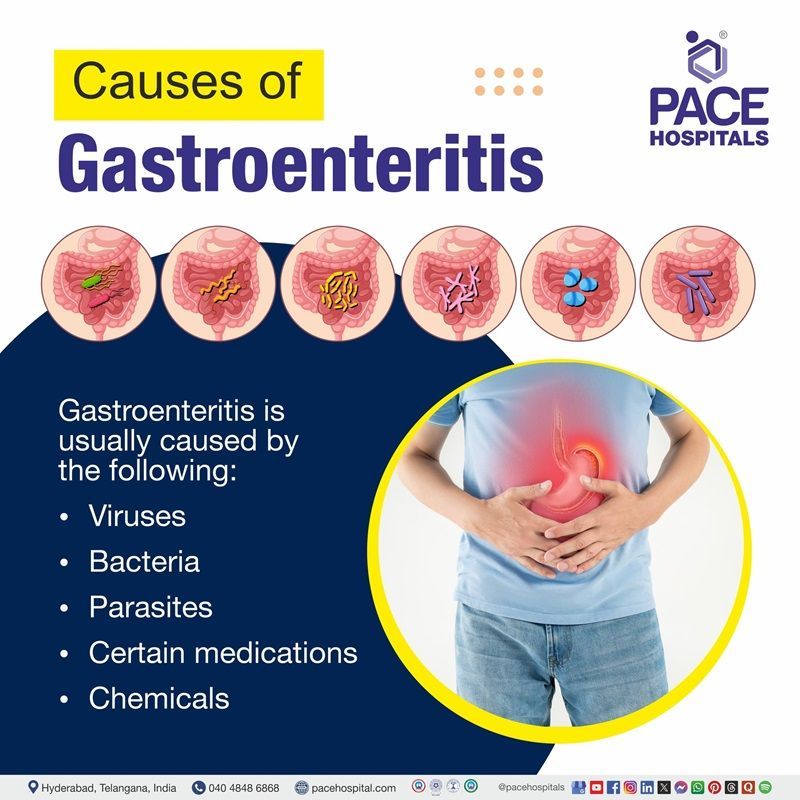
Gastroenteritis Causes
Gastroenteritis is usually caused by viruses; however, gut bacteria, parasites, and fungi can also cause gastroenteritis. Other acute gastroenteritis causes include chemical toxins, drugs, and medications:
- Virus: The majority of viral gastroenteritis cases are caused by four main viruses: Norovirus, Rotavirus, Astrovirus, and Enteric Adenovirus.
- Bacteria: Bacterial gastroenteritis is less common than viral gastroenteritis, but common bacterial culprits include Campylobacter, Clostridioides difficile, Escherichia coli, Salmonella, Shigella, and Staphylococcus.
- Parasites: Certain intestinal parasites especially Giardia intestinalis attach to the intestinal lining, causing nausea, vomiting, diarrhoea, and discomfort. Giardia and Cryptosporidium are among the most common parasites responsible for gastroenteritis.
- Medications: Clostridioides difficile-induced diarrhoea often occurs due to antibiotic use, disrupting gut flora. Laxative abuse can also trigger gastroenteritis-like symptoms, including weakness, vomiting, diarrhoea, electrolyte imbalances, and other disturbances.
- Chemicals: Gastroenteritis can result from ingesting chemical toxins found in poisonous plants, certain seafood, or contaminated food and water. Chemicals like arsenic and heavy metals (lead, mercury and cadmium) can trigger toxicity. Ingesting these substances may lead to nausea, vomiting, abdominal pain, and diarrhoea, often resembling food poisoning but without an infection.
- Faecal-oral transmission: Gastroenteritis spreads through person-to-person contact, especially if proper hand hygiene is not followed after a bowel movement. It can also occur by touching the mouth after contact with contaminated objects like diapers or toys.
- Foodborne transmission: Gastroenteritis can occur when contaminated food, water, or utensils introduce bacteria, viruses, parasites, or chemicals into the body. It can also spread within groups consuming the same food or through close contact.
Gastroenteritis Risk Factors
Certain factors can weaken the body’s defences or increase exposure to harmful pathogens, making the digestive system more susceptible to infections. As a result, individuals with these risk factors may experience more frequent or severe cases of gastroenteritis:
- Infectious agents: Exposure to infectious agents increases through contaminated food, water, or contact with infected individuals, allowing pathogens to enter the digestive system and cause gastroenteritis.
- Pregnant women: Gastroenteritis is common during pregnancy, affecting about one-third of pregnant women. If left untreated, severe symptoms can result in dehydration and may even trigger preterm labour.
- Older adults: In older adults, enteric infections may present differently than in younger individuals, with symptoms including pain, vomiting, fever, and bloody diarrhoea being less common. The incidence of these symptoms typically decreases with age.
- People with weakened immune systems or other serious health conditions: Individuals with weakened immune systems, or those who are immunocompromised, have a reduced ability to fight infections, making them more prone to severe symptoms and frequent infections.
- Infants: Stomach and intestinal infections in infants can lead to diarrhea and vomiting, posing a greater risk of dehydration in babies and young children than in adults.
- Babies who were born prematurely or have other health conditions: Premature babies, who are more likely to experience long-term health issues such as illnesses, asthma, and feeding problems also face a higher risk of sudden infant death syndrome (SIDS), particularly during sleep.
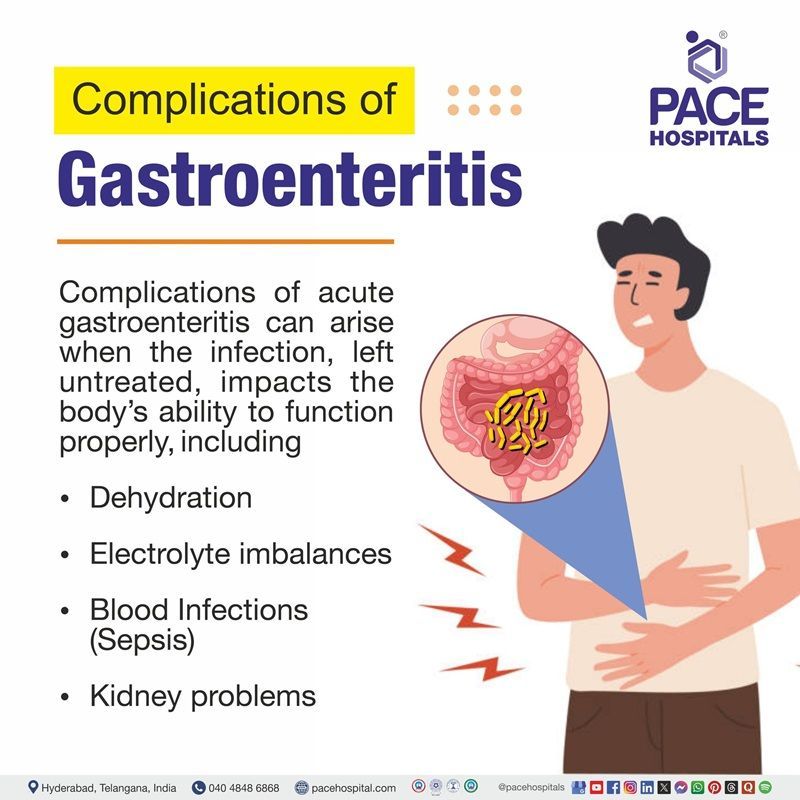
Complications of Gastroenteritis
Complications of acute gastroenteritis can arise when the infection left untreated and can impact the body’s ability to function properly. In some cases, complications may require medical intervention to prevent further harm:
- Dehydration: Severe vomiting and diarrhoea can lead to significant fluid loss. Symptoms of dehydration include weakness, decreased frequency of urination, dry mouth, and, in infants, lack of tears when crying.
- Electrolyte imbalances: Excessive vomiting or diarrhoea can result in electrolyte problems such as low levels of potassium in the blood (hypokalaemia) and dehydration, which can cause low blood pressure and a rapid heart rate. Low levels of sodium in the blood (hyponatremia) may also develop, particularly if the person replaces lost fluids by drinking fluids that contain little or no salt, such as water and tea.
- Blood Infections (Sepsis): In rare cases, a bacterial infection from gastroenteritis can enter the bloodstream, causing sepsis, a life-threatening condition that requires immediate medical attention.
- Other severe issues: Low blood volume (hypovolemic shock) and kidney failure can occur in severe cases.
Acute Gastroenteritis Diagnosis
If a patient presents with symptoms such as fever, blood in the stool, or vomiting, or has recently been hospitalized, gastroenterologists may consider other gastrointestinal disorders with similar symptoms (e.g., ulcerative colitis). Before recommending specific diagnostic tests, healthcare professionals will first conduct the following evaluation:
- A gastroenterologist evaluation (Diagnostic evaluation of gastroenteritis: Evaluates the patient's present medical history, past history, social history, any allergies and any medications)
- History of contact with ill people, certain animals, or contaminated food or water; recent travel; or antibiotic use
- Physical examination
- Blood test
- Complete Blood Count (CBC)
- Electrolyte panel
- Renal function tests
To confirm acute gastroenteritis diagnosis, a healthcare professional may perform the following diagnostic tests:
- Laboratory testing
- Faecal leukocytes and occult blood
- Faecal lactoferrin
- Stool cultures
- C difficile assay
- Stool ova and parasites
- Imaging tests
- Upper GI endoscopy
- USG (Ultrasound)
- CT scan
Gastroenteritis Treatment
In most cases, gastroenteritis resolves itself. The best way to help the body recover is to give it lots of rest and fluids. Acute gastroenteritis treatment depends on the cause and may include:
- Rehydration
- Drinking plenty of fluids.
- Using oral rehydration drinks
- Medications
- Anti-nausea medications
- Anti-diarrheal agents
- Antibiotics (for diarrhoea caused by Clostridioides difficile)
- Antiparasitic medications (Parasitic infections)
- Probiotics
- Hospitalization
- Hospital admission and IV fluids in severe cases.
If the patient has chemical gastroenteritis due to toxic poisoning, additional treatment may be required to help remove the toxin from the body. Stomach flu treatment will depend on the specific toxin and the patient's condition.
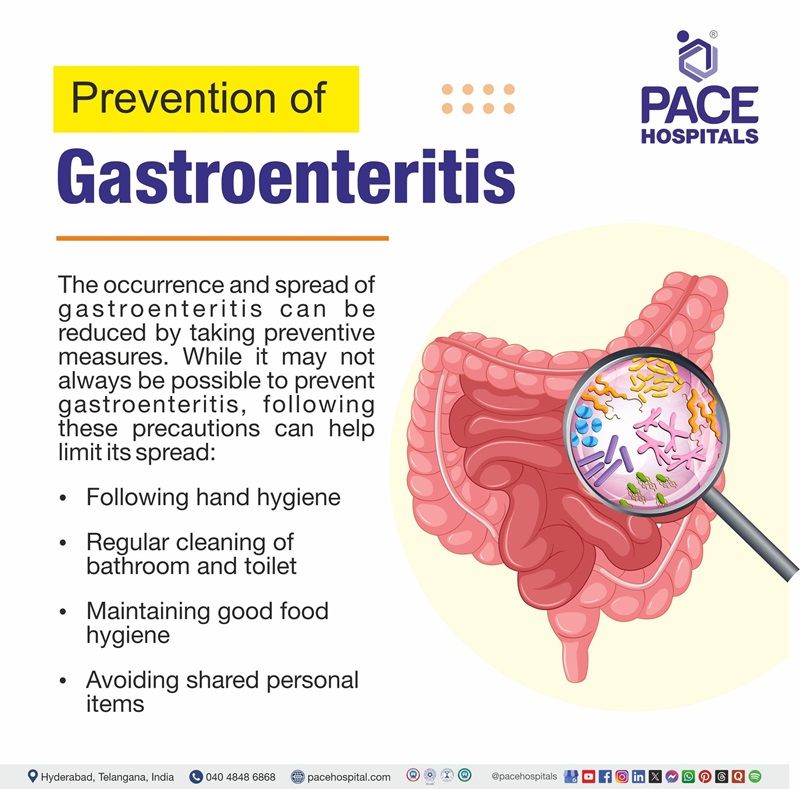
Prevention of Gastroenteritis
The occurrence and spread of gastroenteritis can be reduced by taking preventive measures. While it may not always be possible to prevent gastroenteritis, following these precautions can help limit its spread:
- Hand Hygiene: For children with acute gastroenteritis, frequent and thorough handwashing with soap and water is crucial, especially after using the toilet and before handling food. Alcohol-based hand gels may not be.
- Regular Cleaning of Bathroom and Toilet: It is important to clean the toilet and bathroom regularly, especially high-touch areas like the toilet seat, door handles, and taps, to reduce the risk of spreading infection.
- Good Food Hygiene: It is important to ensure food is always cooked thoroughly, stored properly in the refrigerator, and never consumed after its expiration date to reduce the risk of gastroenteritis.
- Avoiding Shared Personal Items: When children are sick, it is advisable to avoid sharing utensils, cutlery, towels, or flannels, as this can help minimize the spread of infection.
- Avoiding Contact with Others: It is recommended that people refrain from going to work or school for at least 48 hours after their symptoms have subsided.
Difference between Gastritis and Gastroenteritis
Gastritis vs Gastroenteritis
Gastritis and gastroenteritis are both gastric conditions, but they differ in their nature. Gastritis refers to the inflammation of the stomach lining, while gastroenteritis, which can be acute or chronic, involves inflammation of both the stomach and intestines. Often referred to as the stomach flu, gastroenteritis is typically caused by a virus or bacteria. Below are some key factors that differentiate gastritis from gastroenteritis:
| Parameters | Gastritis | Gastroenteritis |
|---|---|---|
| Definition | Gastritis is an inflammation of the stomach lining, or gastric mucosa, which can manifest in various forms, ranging from acute to chronic gastritis. | Gastroenteritis is the inflammation of the stomach and intestinal walls, commonly known as the stomach flu. It is typically caused by a virus or bacteria. |
| Symptoms | Nausea, vomiting, heartburn, loss of appetite, bloating and burping. | Diarrhea, pain or cramping in the abdomen (belly), fever. |
| Causes | Gastritis can be caused by various factors, often leading to discomfort or pain. These include infection with Helicobacter pylori (H. pylori), frequent use of nonsteroidal anti-inflammatory drugs (NSAIDs), excessive alcohol consumption, stress, bile reflux, autoimmune conditions, and smoking. | Gastroenteritis can be caused by viruses, bacteria, parasites, or chemical reactions to certain medications and foods. |
| Treatment | Treatment for H. pylori infection typically involves antibiotics, acid-reducing medications, and antacids. | Treatment includes hydration to replace lost fluids and electrolytes. |
Difference between Viral Gastroenteritis and Bacterial Gastroenteritis
Viral vs Bacterial gastroenteritis
Gastroenteritis can be caused by viruses or bacteria. Understanding the key differences between viral and bacterial gastroenteritis helps in proper diagnosis, treatment, and prevention. Here are the differences between viral and bacterial gastroenteritis:
| Elements | Viral gastroenteritis | Bacterial gastroenteritis |
|---|---|---|
| Causes | Viruses (e.g., Norovirus, Rotavirus, Adenovirus) | Bacterial gastroenteritis causes include Salmonella, E. coli, Campylobacter, Shigella |
| Common Symptoms | Common viral gastroenteritis symptoms include watery diarrhoea, nausea, vomiting, mild fever, stomach cramps | Severe diarrhoea (sometimes bloody), high fever, intense abdominal pain, nausea, vomiting |
| Duration | 1–3 days | Hours to a few days |
| Treatment | Supportive care (hydration, rest); no specific antiviral treatment | Antibiotics in severe cases; supportive care (hydration, electrolytes) |
Frequently Asked Questions (FAQs) on Gastroenteritis
Is gastroenteritis dangerous?
Gastroenteritis is usually mild and self-limiting, but it can be dangerous if severe dehydration occurs, especially in young children, older adults, and those with weakened immune systems. However, severe gastroenteritis cases often require immediate medical attention to prevent complications.
How long does gastroenteritis last?
Gastroenteritis usually lasts between one to three days for viral infections, while bacterial cases may persist for up to a week. Recovery time depends on the cause, hydration levels, and overall health of the individual.
How can I differentiate between gastroenteritis and food poisoning?
Gastroenteritis usually develops gradually over 1-3 days, often due to a viral infection. Food poisoning comes on suddenly (within hours) after eating contaminated food and tends to resolve faster (24-48 hours). Both can cause nausea, vomiting, diarrhea, stomach cramps, and fever. However, food poisoning symptoms are often more intense but shorter in duration.
What are the complications of untreated gastroenteritis?
If gastroenteritis is left untreated, it can lead to severe dehydration, which may cause dizziness, weakness, and, in extreme cases, kidney problems. Prolonged fluid loss can result in electrolyte imbalances, affecting muscle function and potentially leading to irregular heartbeats. Persistent diarrhea and vomiting can also contribute to malnutrition, making it harder for the body to absorb essential nutrients. In some cases, especially in young children, the elderly, or those with weakened immune systems, untreated gastroenteritis can lead to more serious infections or complications that require medical intervention.
Can gastroenteritis be cured?
Yes, gastroenteritis can be cured as it is usually a self-limiting condition that resolves within a few days with proper hydration and rest. Most cases, especially viral gastroenteritis, do not require specific treatment, while bacterial infections may need antibiotics in severe cases. Managing symptoms and preventing dehydration are key to recovery.
What is the treatment for gastroenteritis during pregnancy?
During pregnancy, gastroenteritis treatment focuses on preventing dehydration and managing symptoms, primarily through oral rehydration, a bland diet, and rest, and seeking medical advice for a severe case.
How do you treat gastroenteritis in children?
Treatment for stomach flu in kids mainly focuses on rehydration and supportive care, using oral rehydration solutions to replace lost fluids and electrolytes. It's important to avoid certain drinks and prioritize proper hydration.
How to treat gastroenteritis pain?
Gastroenteritis pain can be managed by staying hydrated, resting, and consuming easy-to-digest foods like broths. Over-the-counter medications can help with discomfort, but anti-inflammatory drugs (NSAIDs) should be avoided as they may irritate the stomach. If pain is severe or persistent, a medical evaluation is recommended.
Can gastroenteritis cause fever?
Yes, gastroenteritis can cause fever, particularly when caused by viral or bacterial infections. The fever is usually mild to moderate but may be higher in bacterial infections. Adequate rest and proper hydration can help manage symptoms and support recovery.
Is honey good for acute gastroenteritis?
Honey is recommended as an oral rehydration option for gastroenteritis, serving as a natural substitute for glucose in rehydration solutions. Studies suggest that honey when combined with electrolytes, can help reduce the duration of bacterial diarrhoea without prolonging non-bacterial cases. Proper dilution and electrolyte balance in the rehydration solution are essential for optimal effectiveness.
What is the most common viral cause of acute gastroenteritis?
Various viruses can cause gastroenteritis, with norovirus being the leading cause of acute gastroenteritis in adults. Globally, rotavirus is the primary cause of gastroenteritis in children.
What to eat or drink being gastroenteritis?
During gastroenteritis, it is best to consume easily digestible foods like bananas, rice, applesauce, and toast (BRAT diet) to help soothe the stomach. Staying hydrated with water, oral rehydration solutions, clear broths, and herbal teas is essential to replace lost fluids and electrolytes. Avoid dairy, caffeine, fatty, and spicy foods until recovery.
Does gastroenteritis show on blood tests?
Gastroenteritis itself may not directly show on a blood test, but blood tests can help detect signs of dehydration, infection, or inflammation. Elevated white blood cell counts may indicate a bacterial infection, while electrolyte imbalances can suggest severe fluid loss. Additional tests may be needed to determine the exact cause.
Is viral gastroenteritis contagious?
Viral gastroenteritis is highly contagious and spreads through direct contact with an infected person, contaminated food or water and contaminated surfaces. Norovirus and rotavirus are common causes and can spread rapidly in close-contact settings. Proper hand hygiene and sanitation help prevent transmission.
What are the viral gastroenteritis treatment options?
Treatment for viral gastroenteritis focuses on managing symptoms and preventing dehydration. Drinking plenty of fluids, including oral rehydration solutions, is essential to replace lost electrolytes. Rest, a bland diet, and over-the-counter medications for fever or nausea can help, but antibiotics are not effective since the illness is caused by a virus.
What is paediatric gastroenteritis?
Paediatric gastroenteritis is a common condition in children, usually caused by viruses like rotavirus or norovirus, leading to diarrhoea, vomiting, fever, and dehydration. Treatment focuses on maintaining hydration with oral rehydration solutions and a bland diet. In severe cases, hospitalization may be required for intravenous fluids and further management.
What are the home remedies for gastroenteritis?
Home remedies for stomach flu include staying hydrated by drinking oral rehydration solutions (ORS), coconut water, or clear broths to prevent dehydration. Consuming bland foods like bananas, rice, applesauce, and toast (BRAT diet) can help once solids are tolerated. Ginger or peppermint tea may ease nausea, while probiotics from yogurt or supplements can support recovery. Ample rest is essential, and it's best to avoid dairy, caffeine, and greasy foods until symptoms improve.
Share on
Request an appointment
Fill in the appointment form or call us instantly to book a confirmed appointment with our super specialist at 04048486868

